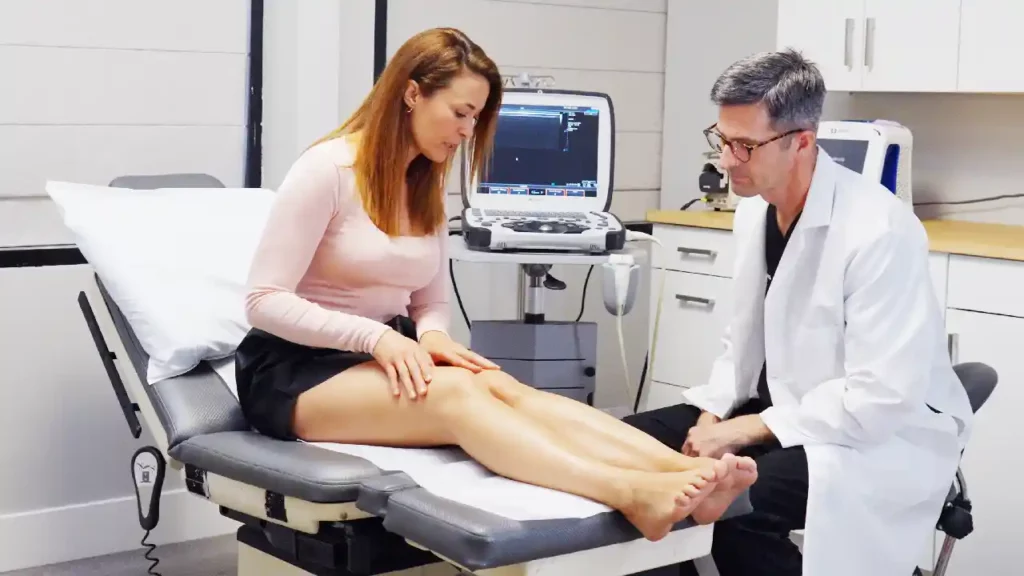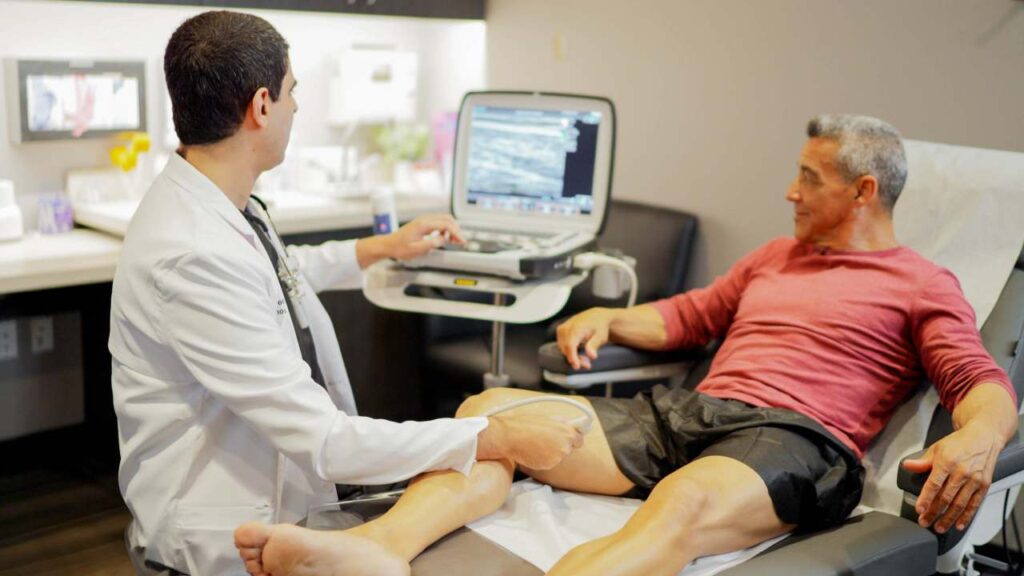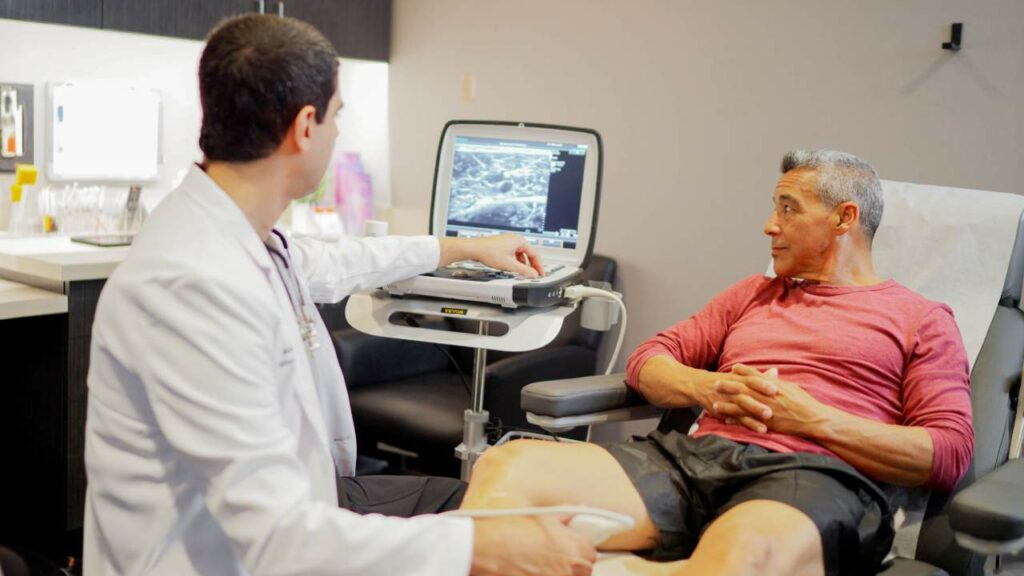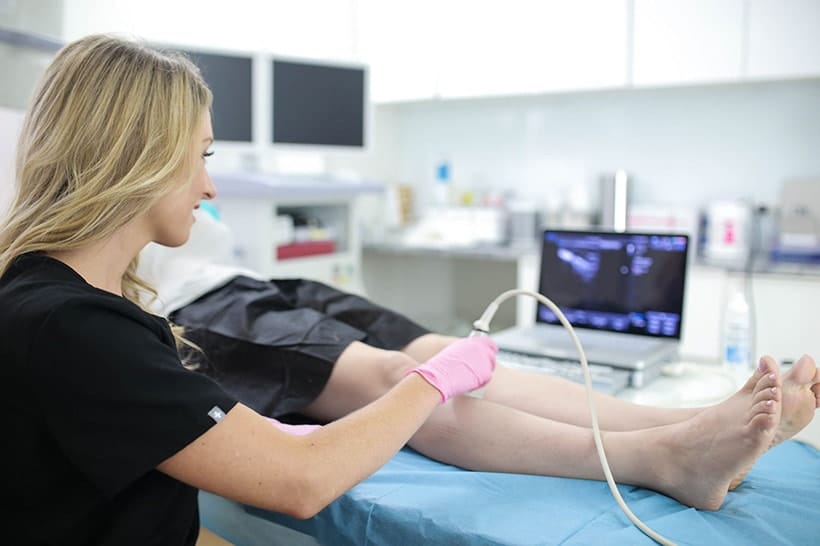Vein Stripping vs. Ablation: Is the Process the Same?
Traditional vein stripping (phlebectomy) involves multiple incisions, typically near the groin and knee, to access and extract a vein from the body. This surgical procedure often requires general anesthesia and hospitalization to monitor the patient for signs of infection or anesthesia complications. Some vein stripping procedures, known as ambulatory phlebectomies, are less prolonged, and the patient might remain awake, requiring only local anesthesia or sedatives. In either case, vein stripping involves closing the incisions, bandages, compression stockings, downtime from your typical routine, and several weeks of healing time.
In contrast, vein ablation is a minimally invasive procedure where the vein is treated inside the body with a small needle or catheter. This method allows patients to avoid general anesthesia, hospitalization, downtime, and healing time. Patients can stand up and move about right away, and even head straight back to work. Vein ablation is the term for closing a malfunctioning vein in order to repair spider veins, varicose veins, or vein disease, and this can be done with heat (radiofrequency ablation or endovenous laser ablation), sclerosants (sclerotherapy), adhesives (cyanoacrylate glue), or a combination of methods. Click HERE to schedule vein ablation at our award-winning California vein center today!

How Long Does Vein Ablation Take Compared to Surgery?
Vein ablation typically takes 15-30 minutes. Many patients will only need one treatment, but others might need more than one session, depending on the number of veins to treat. Vein surgery is a longer process, typically requiring an overnight stay in the hospital. Some surgeries are performed on an outpatient basis, but still require a few hours, if general anesthesia is involved. Recovery from vein ablation is also faster, as patients can head back to work right away. Patients will notice a difference in the treated varicose vein promptly, and the vein will continue to lighten and disappear over the next few days.
Is Ablation Recovery Like Post Varicose Vein Surgery Care?
Varicose vein surgery and non-surgical vein ablation have very different recoveries. Surgical patients might need to remain in the hospital and might have bandages, stitches, and wounds to contend with. They might have complications from anesthesia or pain and swelling at the incision sites. Infection and bleeding are possibilities, along with blood clots and DVT.
Vascular surgeons take every precaution to avoid these complications, but surgery carries certain risks that non-surgical procedures don’t. Recovering from surgery might take weeks or months, and patients will likely have to avoid getting the area wet or doing much activity for a while. Compression stockings are likely, and there are certain medications that you should avoid until your doctor approves them.
What’s the Radiofrequency Ablation Recovery Time?
With sclerotherapy or radiofrequency ablation of varicose veins, recovery time isn’t even a factor. Patients can resume their typical lifestyle immediately. There are no wounds or stitches to contend with, and usually no bandaging after the first day. Some patients will need to wear the stockings their doctor provides for a few days, but others won’t need compression. You can get the area wet immediately, with most ablative methods, and you don’t have to stay off your feet.
In fact, our vein doctors recommend walking right away and remaining active after vein ablation to encourage blood flow. Recovery is not complicated with minimally invasive vein treatment, and it’s much faster than with surgery. Your doctor will let you know whether to avoid strenuous exercise or certain medicines for a few days, but otherwise, it will be life as usual.
Is There Swelling After Vein Ablation or Vascular Surgery?
The amount of swelling after vein ablation depends on the modality. If your vein doctor uses heat (radiofrequency or endovenous laser ablation) to close the vein, they will first surround the treated vein with tumescent anesthesia to protect the adjacent tissue. This fluid will cause the treated area to feel mildly swollen temporarily until it’s absorbed. Typically, swelling does not persist beyond the next morning. Ablative techniques that don’t use heat (sclerotherapy, vein adhesives) are even less prone to swelling.
Swelling from surgery can take weeks or months to relent, depending on the severity of vein damage and the size and number of incisions. You can reduce swelling from any vein procedure by using ice and elevation if your doctor recommends them. Compression stockings will help prevent blood clots and might help with swelling too. Do not take non-steroidal anti-inflammatories like ibuprofen for swelling, unless your doctor advises you to, since these thin the blood (a potential risk for heavy bleeding after surgery).
Is Vascular Surgery the Varicose Veins Treatment of Choice?
Some patients assume that vascular surgery is the best varicose veins treatment because it removes the offending vein. In actuality, varicose veins are often produced by valve failure in deeper veins, so treating that underlying issue is the key to long-term varicose vein relief. Vein specialists can treat this valve failure with small needles and special catheters without extracting the vein (except in rare cases where the patient’s vein is so enlarged or burdened by blood clots that removal is the safest choice). Treating a varicose vein with endovenous ablation should always be the first choice.
Varicose Vein Treatment Before and After: Is Ablation Easier?
With varicose vein removal, before and after care depends on the procedure. For surgical varicose veins treatment, there might be restrictions on foods, medications, and activities prior to surgery. You’ll need to arrive early and bring someone to drive you home. Afterward, you won’t be able to drive or resume all your typical activities, and you might have to stay off your feet. There will be swelling, discomfort, wound care instructions, and possible food and medication restrictions. Your overall healing process could take weeks or months.
Vein ablation has minimal prep involved and there’s no need to arrive earlier than a typical doctor appointment. You might want to wear loose clothing, since we can often treat the vein without you needing to change into a gown. You’ll lay comfortably, with your leg positioned for treatment, and the entire process will be done in 15-30 minutes. Afterward, you’ll wear compression stockings if your doctor suggests them, and use ice and elevation to reduce swelling or mild discomfort. Your doctor will recommend that you walk and avoid sitting or standing for long periods of time right after the procedure.
Why Choose Endovenous Ablation Therapy of Incompetent Vein?
Unless you are one of the few patients whose condition requires surgical varicose veins treatment, surgery is not the preferred method for varicose or spider veins. Those who require surgery should be encouraged to know that surgical advances have made invasive vein treatment safer and easier than ever before. But it is advantageous to use minimally invasive tactics whenever possible.
Endovenous ablation therapy, which includes popular treatments like Varithena, ClariVein, VNUS Closure, ClosureFast, and VenaSeal, are quicker, gentler, safer, and more affordable, and they don’t disrupt your busy life. Patients frequently complete vein ablation within their lunch break. When doctors use methods like radiofrequency ablation on varicose veins, complications are remarkably rare, and patients are thrilled with the results. In addition, insurance typically covers these procedures, so you don’t have unnecessary medical bills.
Whether you’re seeking spider vein treatment, treatment for varicose veins, or simply want to learn more, visit our acclaimed vein center in California. Our vein doctors are experts in the full range of spider, varicose, and great saphenous (GSV) vein treatments and are happy to explain what to expect after vein ablation. We’re committed to exceeding your expectations!






